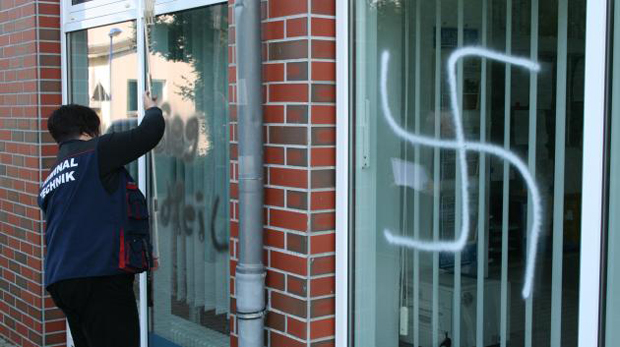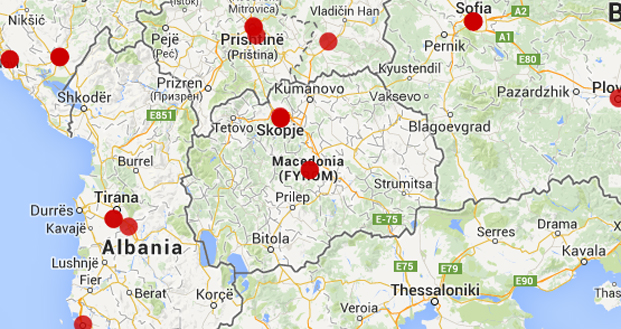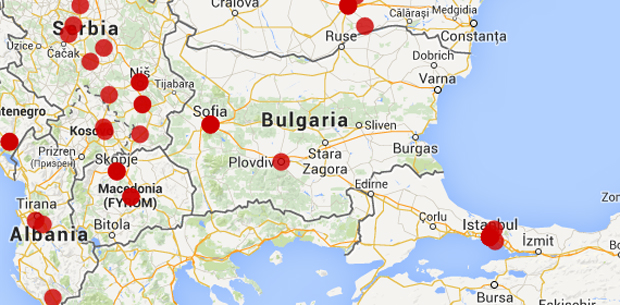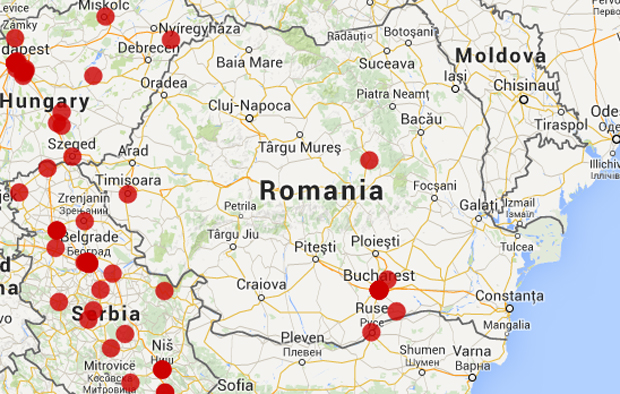8 Oct 2014 | Mapping Media Freedom, News, Politics and Society, Romania
In November, Romanians are set to head to the polls to elect a new president from a field of 14 candidates during two rounds of polling. But one important participant, the National Audiovisual Council of Romania (CNA), will be sidelined as it loses its legally mandated quorum.
According to the CNA’s website, its role is to “ensure that Romania’s TV and radio stations operate in an environment of free speech, responsibility and competitiveness.”
While the first round of voting is set to get underway on 2 November, the CNA’s quorum of eight will be halved on 4 November when four members of the council step down at the end of their terms. If no candidate wins a majority in the first poll, the top candidates will compete in a second round on 16 Nov.
“Without a quorum, the CNA cannot function, and thus it cannot sanction the eventual abuses of television or radio stations during the election campaign,” said Narcisa Iorga, a CNA board member. Iorga believes politicians will benefit from this, as it is in their best interests to have an inactive CNA. Television stations will also use the situation in their favor, though they are already accustomed to breaking the audiovisual legislation, she added.
According to some members of the council, it could be January before the CNA regains its quorum and the ability to make decisions on issuing sanctions, well after the election campaign and the two rounds of voting.
The CNA is Romania’s only regulatory body overseeing television and radio programmes. In its watchdog role, the regulator ensures that legislation governing programming is respected. It’s a key role in a country where television is the dominant media among the population. Political parties and interest groups use the country’s live television shows to get their message across to the public.
By law, the CNA is supposed to have 11 board members. To maintain a quorum, eight members need to be present at the proceedings. The members, who have a mandate of six years, are nominated by the senate (three members), the chamber of deputies (three), the president (two), the government (three), and are confirmed by the parliament.
This is where politics comes into play: the parliament, controlled by a coalition led by the party of Victor Ponta, the prime minister who is the best-placed candidate at the presidential elections, did not vote to confirm the new members before the parliamentary vacation began. Therefore in less than a month, the CNA will have only seven members, one member short of the quorum.
Not having enough members to be able to take decisions is nothing new for the regulatory body. When there are politically sensitive issues on the table, some of its members usually go on a vacation.
For example, on 9 October a number of complaints against the Antena 3 news television will be debated, but it is more than likely that will be no quorum. Two CNA members are currently on vacation, and another two just announced their absence, wrote Iorga on her Facebook wall.
Media violation reports from mediafreedom.ushahidi.com
Penal code change could ensnare journalists
Falun Gong practitioner detained during interview
Journalists denied access to government building
Director of public television receives “warnings”
Jurnalul National editor assaulted and threatened
This article was published on 8 Oct 2014 at indexoncensorship.org
15 Sep 2014 | Germany, Mapping Media Freedom, News, Politics and Society

Vandals attacked the Lausitzer Rundschaufor the second time in a week.
On the night of September 4-5, the daily newspaper Lausitzer Rundschau became victim to a crime by now familiar to its employees: neo-nazis vandalised the outside of one of its office buildings in the eastern German city of Spremberg, covering it with anti-Semitic graffiti. Less than a week later, on the night of September 8-9, another Lausitzer Rundschau office in the nearby city of Lübbenau faced a similar attack.
The incidents were covered by national and local media in Brandenburg, the state surrounding Berlin. Right-wing extremism has been a sensitive topic for the Lausitzer Rundschau—only two years ago, the newspaper’s Spremberg office was also vandalized by neo-Nazis who left graffiti and an animal carcass outside the building. Shortly before the 2012 attack, the newspaper had reported critically about a right-wing extremist march in Spremberg.
Klaus Minhardt, president of the German Journalists’ Association’s local Berlin-Brandenburg chapter, sees offences like the ones against Lausitzer Rundschau as motivated by a small group of individuals lashing out against specific media reports.
“People like to make journalists their victims and to take revenge out on them. Usually, somebody does something bad and the journalist who uncovers that becomes the face of the issue,” Minhardt said.
A few days before the September 4 attack, Lausitzer Rundschau ran a report on a trial in the nearby city of Cottbus, where police testified that right-wing extremist paraphernalia was found on an alleged assailant’s body. Johannes M. Fischer, editor in chief of Lausitzer Rundschau, says the newspaper’s reporting on the trial is one reason for the recent vandalism. Another, says Fischer, is the upcoming Brandenburg state elections on September 14. Election posters in the area surrounding Lausitzer Rundschau’s offices were also covered in anti-Semitic graffiti after both of the new incidents.
This past week’s attacks on the newspaper were shocking because they were repeated in quick succession. According to Fischer, the kind of vandalisation was also more brutal than the previous incident in 2012.
“The quality is different. It has a horrible quality. The sayings are more violent. ‘Jews, Jews out, gas Jews,’ which was abbreviated as VE.G.,” Fischer said.
Because of the proximity between the two offices in Lübbenau and Spremberg, police have said that the same people are likely responsible for both of the September attacks on Lausitzer Rundschau. Fischer is also convinced that a only a few dozen people are behind the vandalisation, and he stresses that the Lausitz region is tolerant, while locals have expressed support for the newspaper after the attacks.
Lausitzer Rundschau has become well known for its aggressive reporting on neo-nazi activity in the region, which covers parts of the eastern German states of Brandenburg and Saxony. In 2013, two of the newspaper’s reporters won national prizes for their work on right-wing extremists in the area.
The “tough staff,” Fischer says, is not intimidated by the attacks on their offices and is determined to continue covering neo-nazi groups there. Fischer still refers to the vandalisation as a threat, and says he has offered reporters various options if they feel uncomfortable working after the attacks.
“They could switch to a different beat. And we also said, ‘You don’t have to write about this topic,’” Fischer said.
None of the Lausitzer Rundschau journalists took Fischer up on that offer. He adds, “They say, ‘Now we really have to do this.’”
More reports from Germany via mediafreedom.ushahidi.com:
Deutsche Welle accused of censorship
Public broadcaster fires blogger
Photographer arrested at protest
ECHR rules court decision to stop publication about Chancellor Schröder was illegal
Head of state chancellery intimidates journalists with legal warning
This article was published on Monday Sept 15, 2014 at indexoncensorship.org
12 Sep 2014 | Macedonia, Mapping Media Freedom, News, Politics and Society

Index on Censorship and Osservatorio Balcani e Caucaso are joining forces to map the state of media freedom in Europe. With your participation, we are mapping the violations, threats and limitations that European media professionals, bloggers and citizen journalists face everyday. We are also collecting feedback on what would support journalists in such situations. Help protect media freedom and democracy by contributing to this crowd-sourcing effort.
Journalists have raised concerns over a new round of amendments to Macedonia’s Law on Audio and Audiovisual Media Services (LAAMS).
According to the Association of Journalists of Macedonia, the changes increase the role of the director of the Agency for Audio and Audiovisual Media Services in disciplining media. The government can now also subsidise up to 50% of domestic film production costs for private media.
“We find this problematic because it brings risk that the government will influence even more national media by using public funds to cause certain content to be produced and broadcast. In our opinion this should be banned. Obligatory domestic production should be reduced taking into account its financial implication on the media,” Dragan Sekulovski, executive director of the Association told Index on Censorship.
For its part, the agency claims that the law’s aim is to promote media freedom.
“The suspicion for censorship is ill-founded, since, according to the constitution of the Republic of Macedonia, censorship is forbidden,” Maja Damevska, spokesperson for the agency, told Radio Free Europe/Radio Liberty. “The regulatory body takes care only of proper implementation of the media legislation and therefore has never undertaken a measure or an action that can be considered censorship.”
More reports from Macedonia via mediafreedom.ushahidi.com
Macedonian Court does not recognise violation of the right to freedom of expression
Macedonian contributor attacked over contribution to Freedom House report
Police officer infringes journalist’s phone data privacy
Telma TV under government pressure
Police pressure journalists during protests in Skopje
This article was posted on Sept 12, 2014 at indexoncensorship.org
13 Aug 2014 | Bulgaria, Mapping Media Freedom, News, Politics and Society

Index on Censorship and Osservatorio Balcani e Caucaso are joining forces to map the state of media freedom in Europe. With your participation, we are mapping the violations, threats and limitations that European media professionals, bloggers and citizen journalists face everyday. We are also collecting feedback on what would support journalists in such situations. Help protect media freedom and democracy by contributing to this crowd-sourcing effort.
Bulgarian journalists covering the financial beat can breathe freely as the most controversial parts of the so-called “bank censorship” amendment to the criminal code have been removed by the legal committee of the national assembly.
In July, parliament adopted the amendment on first reading. The text of the draft outlined sentences of two to five years in prison for circulating “false or misleading information” about banks that could “cause panic”.
The amendment was suggested indirectly by the Bulgarian National Bank (BNB) after a series of bank runs involving Bulgaria’s fourth largest credit institution, the Corporate Commercial Bank (CCB) and later an unrelated run involving financial institution the First Investment Bank (FIB).
It is still unclear who was behind these incidents. The run against CCB was likely caused by disagreements between media tycoon Delyan Peevski, one of the CCB’s large depositors and his old friend, Tsvetan Vasilev, the owner of CCB. Peevski started to remove funds, sparking a bank run which undermined the bank’s liquidity.
In the FIB case, three people have been arrested. They are suspected of spreading rumours about the imminent bankruptcy of FIB via emails and short text messages to the bank’s clients. This stirred mass panic, as people rushed to withdraw their money from the bank: in a few hours, BGN 800 million (£327 million) were withdrawn.
“Society is very sensitive especially to issues that affect the financial and banking stability as the memory of the banking crisis in 1996-1997 is still fresh,” said Petya Stoyanova, a financial and banking journalist from Bulgaria. During that crisis, 14 Bulgarian banks collapsed.
The memory of the mid-1990s financial crisis is the main reason behind the low public confidence in the Bulgarian banking system, which can easily be moved to panic. As a response, BNB proposed an amendment to the criminal code on 1 July stating that those who “disseminate misleading or untrue information on a bank or a financial institution that could create panic among the population, be punished with five to 10 years of imprisonment”.
BNB also proposed a fine ranging between BGN 5,000 and BGN 10,000 (£4,061) to be imposed in such cases. People causing significant damage or those having received significant illegal revenues through the aforementioned activities would be punished the same way.
According to Stoyanova, the proposals have been criticised by politicians and lawyers because of its vague language which, in a broad interpretation, could lead to a conviction for dissemination of any information related to the banking sector, even if it is not false or misleading.
After the first reading of the amendment in parliament, members of the legal committee applied a number of corrections. The revised amendment removes the danger of censorship by tightening up the language, which now refers to disseminating “false” banking information. While the potential fines for those spreading such information were increased, the possibility of prison has been eliminated.
The banking scandals hinted at the dimensions of backstage political machinations in Bulgaria. Stoyanova believes responsibility for malicious behaviour should have a place in future changes to the criminal code. Future lawmakers, she said, should not be allowed to quickly alter laws in violation of rules and best legislative practices, without public discussion.
The second reading of the amendment will be left to the next national assembly, as parliamentary elections will be held on 5 October.
More reports from Bulgaria via mediafreedom.ushahidi.com
Election law amendment could limit press freedom
Attacker sprays substance in Bulgarian sports journalist’s face
Bulgarian journalist beaten by football fans
Newspaper reporters attacked, threatened in Bulgaria’s city of Plovdiv
Arson Attack Against Bulgarian Journalist Genka Shikerova
This article was posted on 13 August 2014 at indexoncensorship.org




